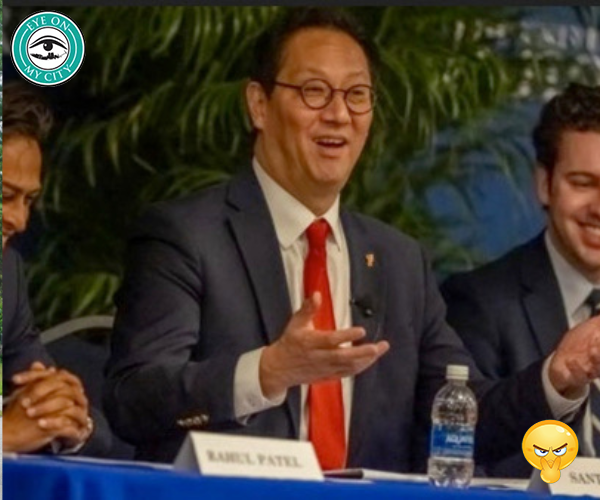As the city tries to extricate itself from the Plant Vogtle mess, it keeps getting deeper. Recently, the city’s bond rating has been lowered, prompting an injudicious outburst from the city’s chief administrative officer.
“The city’s action calls into question its willingness to support an absolute and unconditional obligation of its largest municipal enterprise, which weakens the city’s creditworthiness on all of its debt.” Moody’s credit rating service said
Sam Mousa responded to the downgrading by Moody’s by slamming Moody’s, noting the city’s track record of making debt payments on time.
“This downgrade is based on wild speculation, completely without rationale or merit, and not at all indicative of the city’s commitment to pay its debt, or its financial strength and integrity,” Mousa told First Coast News.
A lawsuit the city has filed is part of an effort by the city to protect taxpayers and JEA consumers from a “skyrocketing, out-of-control” project with “no certainty in cost or completion timeline,” Mousa said.
But no satisfactory explanation has been forthcoming from City Hall as to how and why JEA got into the skyrocketing, out-of-control project.
Ranting at the agency that rates your bonds might not be the wise course, especially when the facts point to a different cause of the problem.
Ten years ago the JEA entered into a power purchase agreement that would commit itself to buying nuclear-generated power from Plant Vogtle, in Georgia. But the project is many years and many billions beyond the original plan and JEA may be obligated to pay billions even if it does not get any power in return.
In addition, the bankruptcy of one of the participants has resulted, the city alleges, in a fixed cost becoming a virtually unlimited cost.
The unanswered question is how the JEA was allowed to get into the agreement. The Office of General Counsel is supposed to provide legal advice and oversight to the city and its independent agencies. JEA apparently was using outside counsel when it became involved with Plant Vogtle, as it is allowed to do, but the general counsel should have been overseeing the agreement.
The city now is claiming in court that the deal should have been approved by the City Council but was not.
Why not? It was the duty of the general counsel to make sure the JEA followed proper procedure.
It says quite clearly in the city charter: “The head of the office of general counsel shall be the general counsel who shall be the chief legal officer for the entire consolidated government, including its independent agencies.”
The general counsel should have signed off on the original agreement, even if it was negotiated and/or drafted by outside counsel, and should have notified the JEA if it needed council approval. If the agreement subsequently was modified, how was it done unilaterally and without review by the general counsel?
Again, the charter: “The General Counsel may authorize the independent agencies to engage outside counsel upon certification by the General Counsel of compliance with the Charter and with the agency’s authority and a written finding of necessity by the General Counsel. The General Counsel may authorize the City to engage outside private counsel upon written certification by the General Counsel of its necessity, and such engagement shall be in accordance with procedures set forth by the City Council.”
After the general contractor filed bankruptcy, a new cost-plus construction contract with a new general contractor was entered into that greatly increased JEA’s exposure, which is now uncapped. The project initially was expected to cost $9.5 billion with a guaranteed maximum price that limited JEA’s liability.
Current cost-to-completion estimates exceed $27 billion, and that number is expected to increase. JEA is obligated to fix the rates for its electric utility and charge its ratepayers at levels at least sufficient to meet its obligations thereunder and must pay those obligations first, prior to making debt service payments on its own debt, the city says.
The city claims the JEA was not permitted by MEAG to participate in any way with the negotiation of the terms of the Construction Agreement or the decision to press ahead with construction of the Additional Units despite the absence of any economic reason to do so. “Thus, JEA is not a party to, did not authorize, and did not participate in any way with, the Construction Agreement or the ill-advised decision of the Co-Owners to continue with the Vogtle Project,” according to the city’s request for a declaratory judgment.
So the city is arguing that the original 2008 agreement was illegal, and that the 2014 amended agreement was illegal because it was done without JEA participation. Neither argument explains why the JEA’s lawyer – the Office of the General Counsel – did not advise its client properly.
The last time the JEA ventured into nuclear power was in the early 1970s. It was prepared to enter into a contract with Offshore Power Systems to buy a floating nuclear power plant, but General Counsel Harry Shorstein advised the JEA board that the proposed contract did not offer JEA customers sufficient protection, and the deal foundered.
Is this case, the Office of the General Counsel did not act. Why?
We asked the general counsel and the answer was: “This office does not comment on pending litigation.”
[author] [author_image timthumb=’on’]https://eyeonjacksonville.com/wp-content/uploads/2018/04/Lloyd-Brown.jpg[/author_image] [author_info]Lloyd was born in Jacksonville. Graduated from the University of North Florida. He spent nearly 50 years of his life in the newspaper business …beginning as a copy boy and retiring as editorial page editor for Florida Times Union. He has also been published in a number of national newspapers and magazines, as well as Internet sites. Married with children. Military Vet. Retired. Man of few words but the words are researched well, deeply considered and thoughtfully written.[/author_info] [/author]








